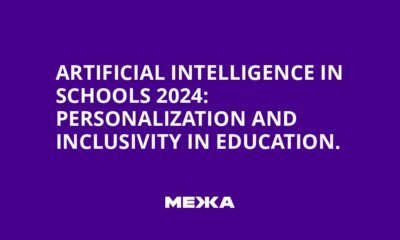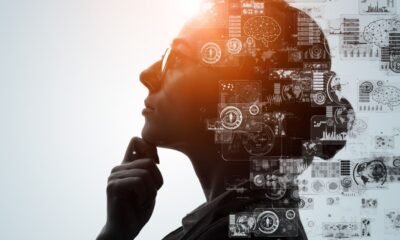Education
Delhi govt. partners with Google to integrate AI in education

elhi government collaborates with Google to explore AI-driven solutions aimed at personalising learning, supporting teachers, and enhancing student engagement.
The Delhi government is set to explore how artificial intelligence (AI) and advanced digital tools can transform the city’s education system with a team from Google.
During a recent interaction with the members of the Google education team, Delhi Education Minister Ashish Sood discussed ways in which AI-powered solutions can help personalise learning experiences for students at every level — from schools to higher education institutions.
The partnership aims to support teachers by automating repetitive tasks, allowing them to focus more on effective teaching and student engagement, Sood said.
Education
The rise of AI tools forces schools to reconsider what counts as cheating – Waco Tribune-Herald
Education
The rise of AI tools forces schools to reconsider what counts as cheating – York News-Times
Education
Unlocking Success with Custom Learning Paths and AI

Highlights
- The age of one-size-fits-all education is making way for something more flexible, and something that may be even more effective.
- AI is making the dream of a truly custom learning path a reality, where the individuality of every learner is respected, instead of being forced to adapt.
- The role of AI in the field of education is to create opportunities for learners to grow at a comfortable pace, discover strengths, and achieve goals
Transforming Education is redefining learning beyond the one-size-fits-all model. For generations, traditional education has made use of a one-size-fits-all model, where all learners are expected to progress through their curriculum at the same pace and showcase a level of understanding that is identical and uniform. Students sat in the same classroom, read from the same textbooks, and moved through lessons at the same pace, regardless of whether the material felt too easy or impossibly hard.
While this approach works to some extent, it leaves behind students who demonstrate a different form of understanding, may it be because of pace, style, or background knowledge. In this era of fast-paced digitalization, rigidity is being challenged by a wave of AI-driven personalized learning.
AI is changing how we approach education by offering learners a custom learning path, enabling them to study in a manner that suits them best, be it in terms of abilities, interests, or goals. Adaptive technology is no longer a futuristic idea; they are actively reshaping how classrooms, corporate training, and online education platforms are implemented.
The Problem with One-Size-Fits-All Education
The traditional model of education has but one major flaw. It is often assumed that all students, no matter what their standing, progress through the same material in the same way. This does not tend to work, as classrooms are filled with students from varied backgrounds, many of whom think and process information differently.
This approach creates a uniform studying environment, but can often lead to frustration among learners. Those who have faster learning capabilities may feel held back, or maybe even bored by lessons that progress slowly. On the other hand, struggling students may be left behind altogether. Over time, this gap widens, leaving many students questioning their ability to succeed. The system’s rigidity does not just hinder a learner’s potential and academic performance; it can also affect confidence and momentum.
How AI is Changing the Game
With the help of AI, students can opt for a more unique path, one that is more personalized. Unlike traditional teaching methods that treat everyone in the same manner, AI tools can be adjusted based on a student’s progress, strengths, and struggles. If a particular learner seems to master a particular concept quickly, the system moves them on to something that may be a bit more advanced. Similarly, if another learner stumbles, it offers extra explanations, practice sessions, or alternative ways of presenting the material.

These systems also learn and adapt to the needs of a student, and are not limited to the pacing of a lesson. Someone who benefits from videos might be provided with more visual explanations, while another who best proceeds through reading will be given text-based resources. Real-time feedback is another powerful feature at play here. Instead of waiting days for a teacher to grade an assignment, AI can immediately highlight errors, explain why something is wrong, and encourage the learner to try again.
In this way, AI is not just delivering content; it is acting like a patient tutor who is available constantly and who adapts to every lesson to the individual sitting in front of the screen.
Platforms Leading the Way
This shift to a more personalized experience is not a distant dream. Many platforms are already showing what this type of learning looks like when in practice. Language-learning apps, for example, adjust lessons on the fly depending on how questions a learner gets right or wrong.
Instead of delivering the same set of lessons to every learner, Duolingo adjusts the content in real-time. If a learner makes frequent mistakes with verb conjugations, the app serves up extra practice in that area. Or if they are excelling, it introduces more complex sentences to keep the challenges alive. Over time, no two learners follow exactly the same path.
Educational websites like Khan Academy now use AI assistants to guide learners through step-by-step exercises, almost like a digital tutor. Moving far beyond its original collection of educational videos, the platform uses adaptive exercises and even an AI-powered tutor named Khanmigo, which guides students through problems one step at a time.

Even major online course providers such as Coursera and edX recommend courses or learning materials based on a person’s career goals or past achievements. For example, someone who completes an introductory course in data analysis might automatically be directed toward machine learning or visualization courses to build their skills. These systems mimic the way a career counselor might guide a student, but they do so at scale, helping millions of learners around the world to find paths that make sense for them.
Corporate training programs are also embracing the tools. Employees no longer need to sit through generic workshops. Instead, platforms can assess what skills they already have and then design a learning path that focuses on areas that need strengthening. This kind of personalization saves a lot of time and ensures that people are learning skills that are directly relevant to their jobs.
Platforms such as LinkedIn Learning or Udemy for Business are helping employees keep up with rapidly changing job requirements. Instead of offering a user a long list of courses that is bound to leave them confused, these platforms use AI to analyze each employee’s role, along with their skills and interests. The result is a well-curated learning journey that focuses on filling specific gaps or preparing for future promotions.
Even in schools, early experiments with personalized platforms are changing the everyday classroom experience. Adaptive math programs like DreamBox and literacy tools such as Newsela tailor various lessons to the needs of the individual, while still aligning with modern curriculum standards.
Why Personalized Learning Matters
When education feels personal, it automatically becomes a lot more engaging for all who are involved. Learners are far more likely to stay motivated when the material feels relevant and, more importantly, achievable. Instead of experiencing the frustration of being lost or the boredom of waiting for others to catch up, students may feel a lot more comfortable being challenged at just the right level. This balance helps keep curiosity alive and makes learning something people want to do rather than something they have to do.

Personalization also improves memory and understanding. By going back and revisiting difficult topics until they are mastered, learners will build stronger foundations. At the same time, they can progress quickly through any material that they feel comfortable with, making the entire process more efficient. For those pursuing careers, this approach ensures that their progress stays aligned with their goals, allowing for actual positive growth.
Perhaps the most important part of personalization is that it has the power to make education more equitable. It does not leave struggling students behind, instead providing them with the additional assistance they need, while more advanced learners continue to move forward. Everyone benefits, and fewer people fall through the cracks.
Challenges on the Horizon
Despite its promise, AI-driven personalization is not without its flaws and challenges. Collecting and analyzing vast amounts of student data naturally raises concerns in terms of privacy and security. Ensuring that this information is used responsibly and stored safely is a major priority. There is also the issue of bias. If the data that is used to train the system is flawed, the AI may tend to unintentionally favour certain groups over others.
Another hurdle to be taken into account is accessibility. Not all schools or communities have the required resources or the infrastructure needed to implement such technologies. There is also the human side to consider, as teachers will no longer be there to deliver content, but instead be dedicated to a mentor or facilitator-like role.

Looking forward, the role of AI in terms of education is likely to become even more transformative. As these technologies become even more widespread, the vision of a world where every learner has access to personalized education could move from possibility to reality.
-

 Business2 weeks ago
Business2 weeks agoThe Guardian view on Trump and the Fed: independence is no substitute for accountability | Editorial
-
Tools & Platforms1 month ago
Building Trust in Military AI Starts with Opening the Black Box – War on the Rocks
-

 Ethics & Policy2 months ago
Ethics & Policy2 months agoSDAIA Supports Saudi Arabia’s Leadership in Shaping Global AI Ethics, Policy, and Research – وكالة الأنباء السعودية
-

 Events & Conferences4 months ago
Events & Conferences4 months agoJourney to 1000 models: Scaling Instagram’s recommendation system
-

 Jobs & Careers3 months ago
Jobs & Careers3 months agoMumbai-based Perplexity Alternative Has 60k+ Users Without Funding
-

 Podcasts & Talks2 months ago
Podcasts & Talks2 months agoHappy 4th of July! 🎆 Made with Veo 3 in Gemini
-

 Education3 months ago
Education3 months agoVEX Robotics launches AI-powered classroom robotics system
-

 Education2 months ago
Education2 months agoMacron says UK and France have duty to tackle illegal migration ‘with humanity, solidarity and firmness’ – UK politics live | Politics
-

 Funding & Business3 months ago
Funding & Business3 months agoKayak and Expedia race to build AI travel agents that turn social posts into itineraries
-

 Podcasts & Talks2 months ago
Podcasts & Talks2 months agoOpenAI 🤝 @teamganassi









